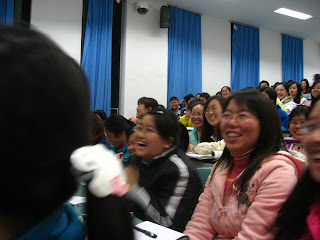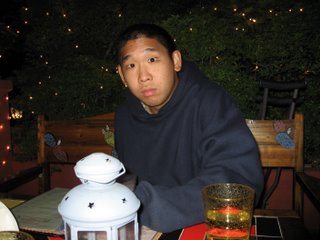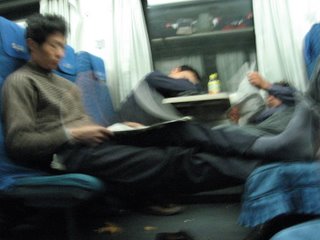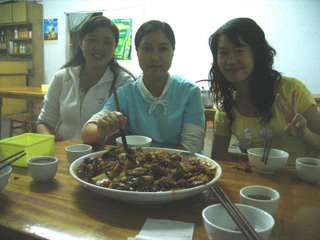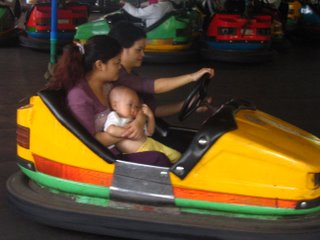I met him at 8:30 at the train station in Xi'an after one of the longest and most uncomfortable train rides I've ever experienced. Trains from Nanchong don't go directly to Xi'an, so I had to transfer in Dazhou, a smaller city about three hours east of here. It was actually very interesting. When I went to go buy the ticket in Nanchong, a man tried to cut in front of me and buy his ticket first at which point the cashier explained something to the man in Chinese, and the man recoiled and went behind me. I couldn't pick up everything the cashier said as the local dialect is enormously different from standard Mandarin, but I could understand it was a scolding of some kind and she was explaining that Chinese people shouldn't act that way. The big stereotype of Chinese train stations is that it's first-come-first-served, and pushing and shoving is not only acceptable but encouraged. This clearly evidences, however, that it's changing and it felt really good to know that someone was on my side trying to help the poor laowai get his train ticket. So, with my ticket now, I left at 4:00 to Dazhou.
After arriving in Dazhou at 7:00, I had three hours until the train to Xi'an. Unfortunately, the train from Dazhou to Xi'an was considerably longer than the train from Nanchong to Dazhou; around ten hours. I should probably mention there are three types of train tickets in China:
-Yingzuo (hard seat: the most basic ticket. Essentially a bench with a thin piece of padding with a cloth cover. It's not bad for short trips, but it hurts after a while and it's nearly impossible to get any sleep unless you're by the window where you can put your head down on the table or next to the window)
-Yingwo (hard sleeper: six beds in an open compartment. 66 beds (I believe) in each car)
-Ranwo (soft sleeper: four beds in a closed compartment. I can't remember off hand how many in each car)
So, I have an yingzuo on the ten hour ride from Dazhou to Xi'an and the biggest problem with the yingzuo is that you have very little leg room. You can't stretch out in front of you because there's another passenger. You can't put your legs into the aisle because there are food c
 arts and cleaning personnel that come down the aisle and have no qualms about stepping on your feet or nudging you to wake up and move. I'm also seated in the aisle seat so falling asleep is much more difficult because there's no armrest and no place to really support your head. I admit I have pretty bad posture so naturally I want just to lean back and prop my head up somewhere to fall asleep. No such luck. Imagine trying to fall asleep on a ten-foot-tall stool, and you have some vague notion of what it's like at 3:42 AM on an yingzuo from Dazhou to Xi'an.
arts and cleaning personnel that come down the aisle and have no qualms about stepping on your feet or nudging you to wake up and move. I'm also seated in the aisle seat so falling asleep is much more difficult because there's no armrest and no place to really support your head. I admit I have pretty bad posture so naturally I want just to lean back and prop my head up somewhere to fall asleep. No such luck. Imagine trying to fall asleep on a ten-foot-tall stool, and you have some vague notion of what it's like at 3:42 AM on an yingzuo from Dazhou to Xi'an.At around 4:00 I got up and walked from one side of the train to the other and managed to scout out a few seats where there was no one sitting in or on the either side of the seat. This meant I could put my head down on the mini table or up against the window and stretch my legs out. It was divine. I managed to get an hour or so of sleep before a group of really loud and screechy women came and began chatting until we arrived.
Once in Xi'an I called my brother and he was still on the train from Beijing. It was about 7:30 and he would arrive in an hour or so. I walked around the train station for a while, bought some bananas and cookies and then returned to the station where I met him.
Stay tuned for part two.
Last thing: there was almost a fight in one of my classes today between two of my male students. It was in my advanced oral English class where I'm having my final examinations in which groups of seven or eight students which have respectively researched topics of the Iraq war, gay marriage, or immigration will use the formal debate structure (opening statement, cross examination, rebuttal etc..) to argue against each other (more about this later). Anyway it was at the end of class and I'm not sure what was said, but one student slammed his water bottle down on his desk and jumped up at which point the two students were face-to-face separated by only a few inches. The rest of the students who were packing up their bags immediately turned and the whole class fell silent. It was scary in that "I hope to god this doesn't happen but it sure looks like it will" sort of way. They looked like mountain goats eying each other out before butting heads. Fortunately, one of them turned away and left before the situation escalated, but I really thought I was going to have to break up a fight. When I went to eat hot pot after class with some other students, they didn't hear what was said, but the two guys involved apparently have a long history of confrontation and both have notoriously short tempers. I'll see if I can more information on what exactly happened later.



